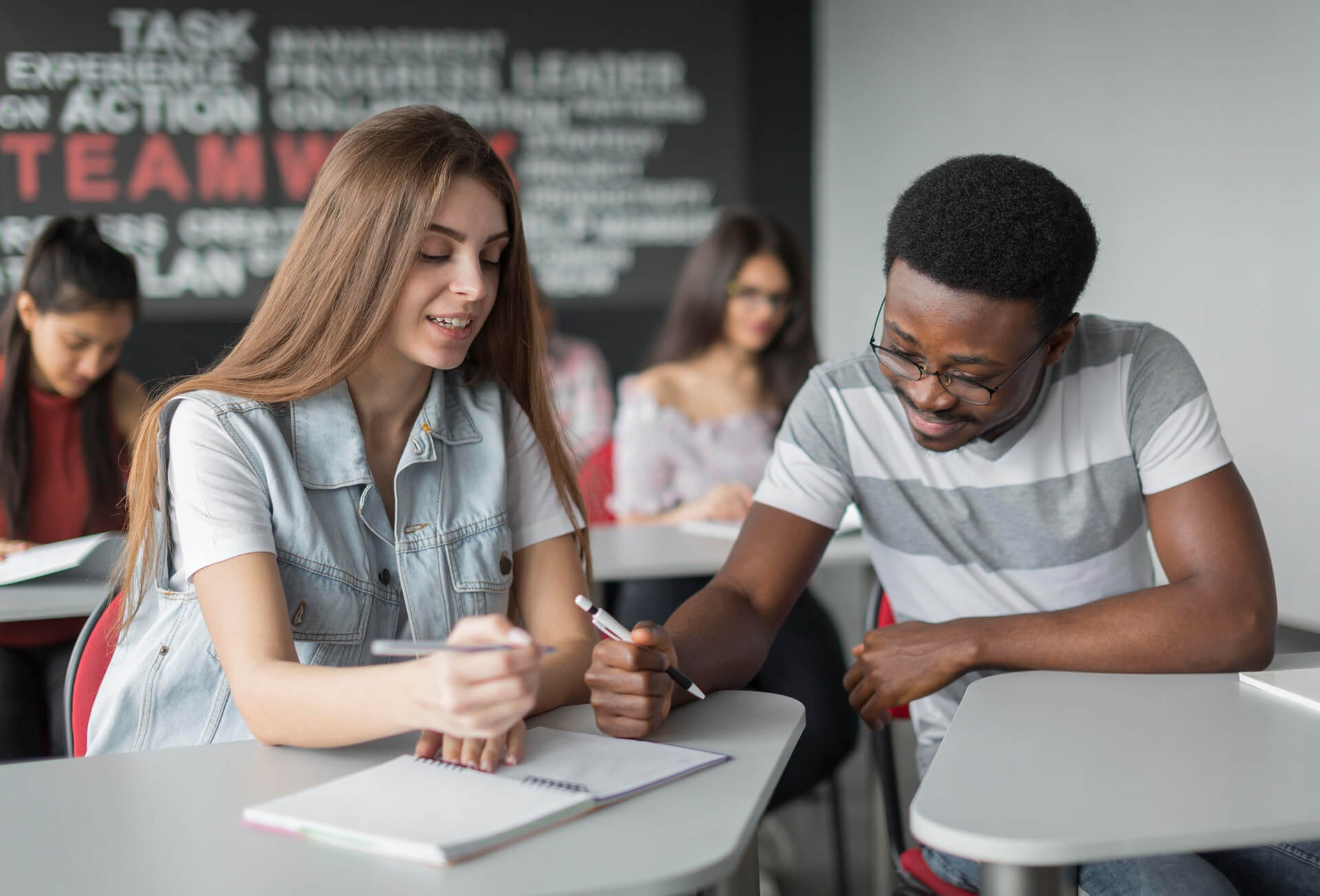XQ Design Principle: Caring, Trusting Relationships
When the COVID-19 pandemic forced a pivot to remote learning, the team at Latitude High…

When the COVID-19 pandemic forced a pivot to remote learning, the team at Latitude High School, an XQ school in Oakland, California, made an intentional effort to meet student needs during this unexpected and stressful transition. They decreased the number of students in each advisory group to ensure a small and manageable advisor-to-student ratio and created mixed age groupings to develop stronger bonds between classes. The team also continued simple but important rituals including spirit week and cultural festivities. They knew that prioritizing relationships would help students academically.
A deep commitment to relationship-building helped Latitude students and educators stay connected during the pandemic, but the benefits of strong relationships between students and their teachers as well as students and their peers go well beyond that.
In fact, we believe that caring, trusting relationships are an essential part of any equity-driven, student-centered high school. It’s one of the six XQ Design Principles that can help communities to rethink high schools so all students graduate ready to pursue the lives that call them.
What are Caring, Trusting Relationships?
Schools are not simply places where knowledge is imparted to young people. The science of adolescent learning shows that learning is a social process, particularly during the high school years, and this aspect, when intentionally addressed, can result in a transformative high school experience. Schools that emphasize getting to know students—both inside school and beyond—are setting a foundation for trust that carries over into academic work. Building positive relationships among students themselves, and between adults and students fosters a climate where students can explore ideas, express themselves, get feedback, and form strong identities.
[
Principles in Practice: Start making change today with the XQ Design Principles rubric.
]
“Research tells us that having even just one close relationship at school can do wonders for supporting students’ learning and development,” explains Lauren Bierbaum, XQ’s head of data, research, and evaluation. “All learning takes place inside social contexts. The human relationships within those contexts are critical components of how students absorb information, develop their identities as learners, and build the skills they need in high school and beyond.”
“All staff hold high expectations for students because they see our potential. They support and help us seek out opportunities and connections for success. The high expectations and support definitely show how much the staff cares about us.”
Nia, Student, Trinity Academy for the Performing Arts (TAPA)
To create an environment where caring, trusting relationships can form requires these elements:
- An intentional focus on relationships—including one strong primary connection: The school’s systems and structure make forming relationships among peers, with adults, and within the community part of the learning experience. Ensuring that every learner is well known by at least one adult in the school means that no one falls through the cracks or misses out on support or opportunities.
- A pervasive sense of trust: Caring, trusting relationships begin with adults who believe in their students and trust their ability to learn. This resulting environment enables risk taking, personal growth, and a willingness to learn from mistakes. In short, teacher beliefs and expectations about students can push them to achieve beyond perceived limitations.
- Opportunities for insight and identity: There is a strong belief that each learner’s journey toward academic success is interwoven in both the formation of their identity and their ability to trust those around them. The learning environment actually helps learners explore and construct their identities, understand varied cultures, and make meaning of themselves and the world around them.
- An emphasis on belonging: There is an inclusive approach to building a sense of belonging in the school for the entire school community—students and adults. Learners feel welcome, safe, and known, and adults offer culturally relevant and sustaining educational practices.

How do educators create caring, trusting relationships?
“What’s very different about this school is that they take the time to help you with your work. They won’t let you give up. Even if you try to give up, they just won’t let you.”
Cassandra, Student, Latitude High
- Believe in your students’ capacity to learn. Teacher expectations and beliefs about students matter. Challenging students with learning experiences that meet them where they are, while also providing high-quality feedback and support will help students craft and meet their goals, and see themselves as people who can tackle challenges and learn from setbacks.
- Design learning experiences around meaningful interactions. When students work with each other, teachers, and community members on projects that solve real world problems helps students engage in work meaningfully.
- Attend to social, emotional learning. Social emotional learning involves a host of competencies that allow students to navigate social interactions, regulate their emotions, navigate conflict, and more. These are tied to academic learning, because all those skills—social, emotional, and academic—must work together for any type of learning to occur.
- Prioritize relationship building. Is there structured time for students to check in with a caring adult during the day? By ensuring that at least one adult has a positive relationship with a student, students are more likely to have academic success, reduced absenteeism, increased motivation and engagement, and reduced emotional distress.
What do Caring, Trusting Relationships look like in action?
“In the shift to remote learning, we created a crisis team for higher-need students, which included a teacher, an academic coach, a special education teacher, and a counselor. These teams were structured around a point person to make sure that the students weren’t overwhelmed with five calls a day.”
Ana Resner, Case Manager, Da Vinci RISE High
XQ schools find many ways to build caring, trusting relationships that empower students to achieve their goals and form strong identities. Given the disruption to in-school experiences caused by the pandemic, many schools have found ways to incorporate relationship building into online components. Take a look!
Students at Círculos, in Santa Ana, California, meet in daily “circles” where they are seen, heard, and given the opportunity to develop their voices. Students discuss their personal goals, victories, and setbacks. These candid discussions set the students’ trajectory for their daily learning. During the pandemic, Círculos intentionally maintained a small advisor to student ratio—a testament to a program that nurtures small-knit connections. The school also held a “Community Week” as an opportunity for students to pause, reflect, build community, attend small group tutoring, join enrichment sessions, and celebrate learning. In their Join Our Circle podcast, students reflect on how they continue to strengthen their relationships with peers in virtual learning.
At Vista High School, in Vista, California, the social-emotional supports previously offered on campus became available via a Virtual Wellness Center. These online offerings create a safe space for students to engage with a trusted adult five days of the week.
Purdue Polytechnic High School, in Indianapolis, Indiana, provides virtual counseling support for students and staff through local 501(c)(3) organization. These services are offered at no cost up to five times a month.
Strategies like advisory group meetings, one-on-one personal check-ins, and wellness hours are all part of how students at Da Vinci RISE High School in Los Angeles, California, receive support. During wellness hour, the school’s case managers talk to students about their wellness toolkits and offer resources to help them add tools like meditation and mindfulness practices to their toolkits.
How can educators get started with building Caring, Trusting Relationships?
“I just want students to hear every single day that they do these amazing things and bring all this value to the space.”
Angela Davis, Former Teacher, PSI High
Here are some tips for how to start building caring, trusting relationships.
- Integrate social-emotional learning throughout all learning experiences. Increase students’ awareness of how their emotions around a topic impact their learning. Include social-emotional learning in advisory sessions. Adding goal setting, SEL skill-building, and relationship-building to scheduled feedback sessions lets students know that they matter to you.
- Try thematic check-ins. Help students get to know each other through thematic check-ins, like asking students to share low-risk personal information with each other. For example, students might share their pets or favorite activities. This community building prompt helps students engage since it shows points of connection through common interests.
- Develop asset-based mindsets with your students. Help students reframe challenges by highlighting and reiterating each students’ strengths—their assets.
Learn more.
Explore the other XQ Design Principles.
Meet the XQ Schools.
Sign up for XQ Xtra, our biweekly newsletter for educators ready to rethink high school.









